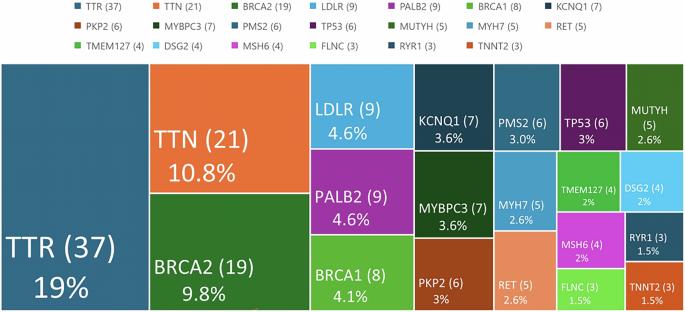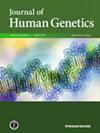ACMG secondary findings in the Brazilian rare genomes project: insights from 5402 genome sequencing
IF 2.5
3区 生物学
Q2 GENETICS & HEREDITY
引用次数: 0
Abstract
Secondary findings (SF) are pathogenic or likely pathogenic variants in genes unrelated to the primary purpose of genetic testing. The American College of Medical Genetics (ACMG) provides guidelines on which SF should be reported, involving 81 genes linked to different conditions. With the increasing use of genome sequencing (GS), SF are more frequently detected, presenting challenges for healthcare systems. The Brazilian population is often underrepresented in genomic studies, which limits population-specific knowledge. This study aimed to outline the profile of SF in the Brazilian Rare Genomes Project (BRGP). We analyzed retrospectively SF (ACMG) data from GS of 5402 BRGP individuals. Of the 5316 cases who consented to receive SF, 3.6% (191 cases) had at least one SF. The most common genes identified were TTR, TTN, and BRCA2. SF were mainly related to cardiovascular conditions (40.2%) and cancer predisposition (37.6%). Some variants, such as TTR: c.424G>A; p. (Val142Ile) and TP53: c.1010G>A; p. (Arg337His), were recurrent, reflecting population-specific traits and founder effects. Novel variants were 10.6% of SF. SF rate varies across studies and populations. While SF can aid early diagnosis, their relevance is debated due to potential psychological and healthcare burdens. Effective genetic counseling and public health policies are essential.

ACMG在巴西罕见基因组计划中的次要发现:来自5402基因组测序的见解。
次要发现(SF)是与基因检测的主要目的无关的基因的致病性或可能致病性变异。美国医学遗传学学院(ACMG)提供了SF报告指南,涉及81个与不同疾病相关的基因。随着基因组测序(GS)的使用越来越多,SF更频繁地被检测到,这给医疗保健系统带来了挑战。在基因组研究中,巴西人口的代表性往往不足,这限制了对人口特异性知识的了解。本研究旨在概述SF在巴西稀有基因组计划(BRGP)中的概况。我们回顾性分析了5402例BRGP患者的SF (ACMG)数据。在5316例同意接受SF的患者中,3.6%(191例)至少有一种SF。最常见的基因是TTR、TTN和BRCA2。SF主要与心血管疾病(40.2%)和癌症易感性(37.6%)有关。一些变体,如TTR: c.424G>A;p. (Val142Ile)和TP53: c.1010G>A;p. (Arg337His),是反复出现的,反映了群体特异性和创立者效应。新颖变异占SF的10.6%。SF率因研究和人群而异。虽然SF可以帮助早期诊断,但由于潜在的心理和医疗负担,它们的相关性存在争议。有效的遗传咨询和公共卫生政策至关重要。
本文章由计算机程序翻译,如有差异,请以英文原文为准。
求助全文
约1分钟内获得全文
求助全文
来源期刊

Journal of Human Genetics
生物-遗传学
CiteScore
7.20
自引率
0.00%
发文量
101
审稿时长
4-8 weeks
期刊介绍:
The Journal of Human Genetics is an international journal publishing articles on human genetics, including medical genetics and human genome analysis. It covers all aspects of human genetics, including molecular genetics, clinical genetics, behavioral genetics, immunogenetics, pharmacogenomics, population genetics, functional genomics, epigenetics, genetic counseling and gene therapy.
Articles on the following areas are especially welcome: genetic factors of monogenic and complex disorders, genome-wide association studies, genetic epidemiology, cancer genetics, personal genomics, genotype-phenotype relationships and genome diversity.
 求助内容:
求助内容: 应助结果提醒方式:
应助结果提醒方式:


